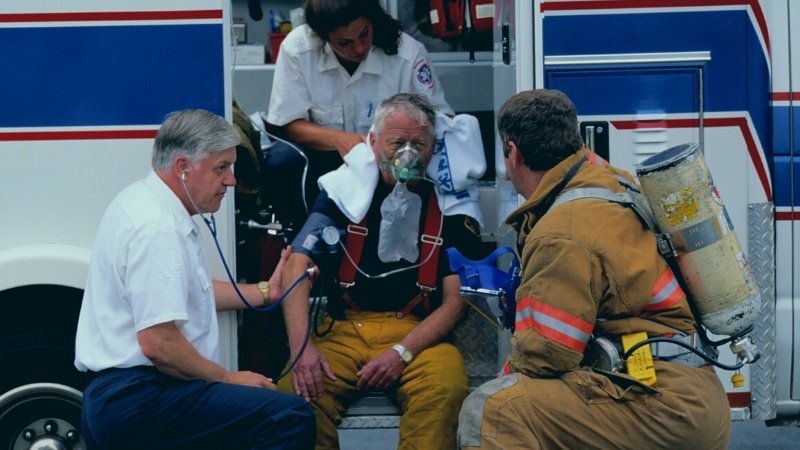According to the American Burn Association, the chance of death in the United States from exposure to fire, flame, or smoke is 1 in 1,442. Death from fire and inhalation poisoning are combined because death from thermal burns in fires cannot always be distinguished from death from inhalation of toxins contained in smoke. Mortality in burn patients is increased by 60 to 80 percent after inhalation of heat. Contrary to how intense and frightening flames can be, smoke inhalation is actually the leading cause of death and serious injury during a fire, not burns and high temperatures.
Inhalation of fumes, carbon monoxide, and other substances from burns can damage the eyes and respiratory system. Nearby toxic fumes, such as from burning buildings, may contain chemicals or poisons such as carbon monoxide and cyanide. When you inhale these harmful fumes, your lungs and airways become irritated, swollen and blocked. Smoke inhalation can have devastating effects on the lungs, leading to chronic and long-term respiratory disease and damage.
Fires, depending on where they occur, can burn both natural and synthetic materials. For example, smoke from forest or grass fires may contain more natural materials than smoke from a warehouse fire, as harmful chemicals in smoke can come from burning rubber, melamine, coal, plastic, or electrical cables. Thus, along with gas explosions and electrical fires, they can elevate the injury from smoke inhalation.
Fire survivors may still suffer from smoke inhalation injury symptoms such as vocal cord pain, corneal damage, and mental status changes due to suffocation. You should immediately contact a doctor where you can get proper medical care. When smoke poisoning injuries are the result of the negligence of third parties, you have the right to sue them. If you are injured due to exposure to smoke, fire, or poor air quality while on the job, you may be eligible for work benefits.
People exposed to HC smoke may complain of irritation of the nose, throat, and chest. People exposed to Smoke Generator 2 (SGF2) mist or other oil fumes may complain of mild irritation or mild cough, feeling short of breath or headache. As with inhalation of most toxic substances, the severity and manifestations of illness are related to the concentration of the smoke or vapor, the duration of exposure, the route of exposure, and the individual’s health status. The nature and extent of exposure may determine the effects on worker health. In smoke-exposed patients, the details of the exposure—duration, amount of smoke inhaled, and toxins contained in the smoke—can help determine the risk of inhalation injury. Data on smoke composition and exposure levels are important for the assessment of occupational accidents.
Fire smoke poses a hazard to workers as it contains harmful chemicals, gases and fine particles. Psychologists say smoke from fires can be a trigger for past trauma and can be worrisome, especially for outdoor workers. Workers in places where there is a risk of smoke and fire remain frequent victims of these incidents. People with toxic inhalation usually have a history of exposure to battlefield smoke or some other environment where phosphorus vapor is used.
Who is eligible for compensation?
As always, the question is whether the worker has been exposed to smoke while on the job or in the workplace. When a firefighter develops smoke inhalation injury complications, it should be assumed that his job was the cause and that he is entitled to all benefits in the form of workers’ compensation and possibly sick leave until he recovers. Employers should be aware that workers who are injured or ill as a result of smoke inhalation or other fire-related causes may be eligible for paid sick leave or sick leave.
If your job requires you to be outdoors near a fire, or when there is smoke from a fire in the air, you may be eligible for workers’ compensation. If you are injured at work as a result of smoke inhalation, you are eligible for workers’ compensation, regardless of how the smoke originated or the type of work you do.If you work outdoors and are injured or ill as a result of exposure to smoke from a fire, you may receive Workers’ Compensation for medical expenses and a percentage of your wages while recovering from your injury. If you are injured as a result of smoke inhalation while working in agriculture or any other industry in California, you may be eligible for workers’ compensation. A typical workers’ compensation insurance plan should cover sickness and injury caused by smoke inhalation. Many workers’ insurance companies initially deny the smoke inhalation allegations, arguing that the lung condition was actually caused by factors outside the workplace (such as smoking, exposure to toxins from the work environment, heredity, etc.).
Smoke Inhalation Injury Settlements
Compensation levels vary from state to state, but unless the claimant is disabled or has disfiguring scars from the injury, workers’ compensation may not be very high. Premiums for workers’ compensation claims are often much lower than expected in traditional personal injury lawsuits. Claims range from $234 for smoke inhalation injury from smoke and ash poisoning to $3 million or more.
As a side note, if you feel like your employer is not taking steps to keep you safe in this regard, you can file a complaint with OSHA. Under California law, employers are liable for employee injuries sustained on the job, whether negligent or at fault. However, California law also provides that if an employee accepts work benefits, they generally cannot recover any legal action from the employer other than work benefits (subject to the exceptions). There are limited exceptions to the aforementioned generalization that a worker who receives work benefit cannot sue their employer; an employee can sue an employer for intentionally harming an employee or knowingly allowing an employee to work in an environment known to the employer as hazardous to the employee.
Contact Experienced Smoke Inhalation Injury Attorney Now
Call Spiro K. Pistiolas, one of the leading California workers compensation today for a free legal consultation regarding smoke inhalation injury complications. Let our professional team of lawyers fight for your right to be compensated for your medical bills, lost wages, and other losses caused by your Smoke Inhalation illness.
Call us at (844) 414-1768 now to book a free consultation.













